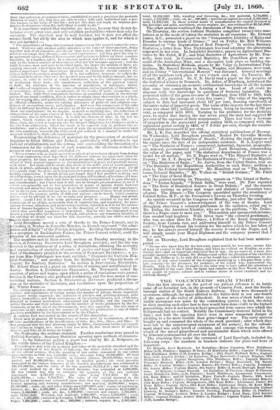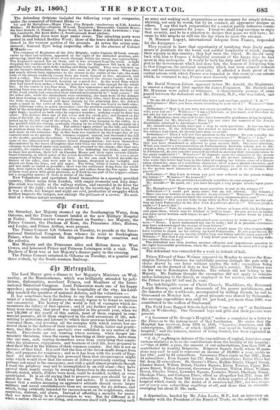THE VOLUNTEERS' SHAM FIGHT.
This the first attempt on the part of our gallant riflemen to do battle came off on Saturday last, in the grounds of Camden Park, near the South- borough station of the South Eastern Railway. There were thousands of spectators, although the space allotted to the battle-field is not one-fourth of the space of the valley of Aldershott. It was seven o'clock before any visible movement was made by the contending parties ; in fact, the delay in their meeting each other face to face would have done credit to the highest generalship, were it not known to have proceeded from causes over which the belligerents had no control. Notably the Commissary-General failed in his duty ; and both the opposing forces were in some temporary danger of yielding to a foe more terrible than grim-visaged war. The early arrivals bought up and consumed the whole of the stock provided ; after which they were left to the uninterrupted enjoyment of the scenery, for the refresh- ment stand was early bereft of contents, and courage was wanting for the attack of the spiced gingerbread and questionable fluids which were offered by itinerant commissaries all over the field. This the first attempt on the part of our gallant riflemen to do battle came off on Saturday last, in the grounds of Camden Park, near the South- borough station of the South Eastern Railway. There were thousands of spectators, although the space allotted to the battle-field is not one-fourth of the space of the valley of Aldershott. It was seven o'clock before any visible movement was made by the contending parties ; in fact, the delay in their meeting each other face to face would have done credit to the highest generalship, were it not known to have proceeded from causes over which the belligerents had no control. Notably the Commissary-General failed in his duty ; and both the opposing forces were in some temporary danger of yielding to a foe more terrible than grim-visaged war. The early arrivals bought up and consumed the whole of the stock provided ; after which they were left to the uninterrupted enjoyment of the scenery, for the refresh- ment stand was early bereft of contents, and courage was wanting for the attack of the spiced gingerbread and questionable fluids which were offered by itinerant commissaries all over the field. The attacking force under the command of Lord Banelagh, included the following corps : the numbers in brackets indicate the place and hour of departure.
1st Brigade, Lord Radstock. 1st Battalion—Major Compton, West Middlesex Rifles (3.30, Pimlico); Captain M'Innes, 3d Middlesex hides; Captain Wilkinson, 14th Middlesex Rifles (3.30, London Bridge) ; 29th North Midland Rifles, Captain Ross (3.30, London Bridge); 2d Battalion, 31ajor Beresford—Captain Hughes, 19th Middlesex Rifles ; Captain Houghton, 20th Middlesex Rifles ; Captain Buxton, Truman's Brewery Rifles (3.30, London Bridge); Major Beresford, 7th Surrey Rifles (3. London Bridge); Captain Emans, 4th Surrey Rifles; Captain Yeatman, 9th Surrey Rifles ; Captain Hastie, 8th Surrey Rifles (4, -South Borough Road Sta- tion). 2d Brigade, Colonel Thorold. 1st Battalion, 31‘Pherson—Dlajor 31•Pherson South Middlesex Rifles (3.30, Pimlico) ; South Middlesex, Lieutenant Crossmann, 8th Kent Rifles; and Id Battalion. Major Farnell—Captain Harris, 13th Kent Rifles • 18th Kent Rifles ; Captain Parker, 21st Kent Rifles ; Lieutenant Rogers, 25th Kent Rifles ; Captain Montgomerie, 34th Rent Rifles ; Lieutenant Carter, 4th Kent Rifles ; Captain Dyke, 16th Kent Rifles ; Lieutenant Drury, 3d Kent Rifles r4, South Borough Road Station). 3d Battalion, Lord Bury—Honourable Colonel Lindsay, St. George's Rifles ; General Dowling, Paddington Rifles (3, Pimlico); Captain M'Gregor, Scottish Rifles (2, London Bridge) ; Lord Bury, Civil Service Rifles ; Captain Phillips, Artists' &flee (3, Pimlico); Captain Taylor, Barnet Rifles
(3.30, London Bridge). The defending divisions included the following corps and companies, under the command of Colonel Hicks :-
let and 2d Battalions—Major Close, City Brigade (rendezvous at 3.30, London Bridge). 3d Battalion—Captain M'Leod, 'Engineers ; Honourable Captain Bruce, Six Feet Guards (3, Pimlico); Major Scott, 1st Kent Rifles (3.30, Lewisham); Cap tam Lanthorde, 33d Kent Rifles (4, Southborough hoed station).
The defending force were kept under cover. The attacking party were posted in and behind Beckley Wood; those of the brave defenders were sta- tioned in the western portion of the grounds. At seven the action com- menced; General Eyre being inspecting officer in the absence of Colonel M‘Murdo :-
The company of Engineers of the City Brigade, under Captain M'Leod, conspi- cuous by their red uniform, appeared on the right of the defended position, and, advancing, lined the edge of the wood, through which the enemy was approaching. The Engineers opened fire on them, and it was returned from the wood. A light dropping fire continued for a few moments, then the Engineers fell back in skir- mishing order on the open field, loading and firing rapidly. They were followed up by the enemy's skirmishers, who were also soon on the clear ground. When they had nearly driven their opponents to the stream in the centre of the vale, the main body of the attack suddenly issued from the wood, formed in line, advanced, and fired a volley. The skirmishers of the defence crossed the stream rapidly, and the attacking line pressed forward, keeping up a quick fire. As the wood from which they had issued here makes a bend, the ground was not wide enough for the whole line. In the centre it was four deep. This first appearance and advance of the at- tacking force was one of the best portions of the spectacle, particularly the dash out of the wood which had concealed their forward movement by its "leafy screen." On the ether side, while the skirmishers were retreating, the main body of the defence had been forming on the level to the right of the lime kilns, their front defended by the little stream. Pressed still more sharply by the attacking line, the defence made a stand in the cover of the lime kilns. The firing was hear), on both sides, volley following volley in quick succession ; but the position soon became untenable. Part of the attacking line crossed the stream, and took its brave defenders on the right flank; assailed on both sides by superior numbers, nothing could be done but retire. The defence drew out of the cover and the chalk pits, and formed on the slope of the hill, the summit of which was crowded by spectators. They were fol- lowed up by the left wing of the attack, the right wing keeping in the valley, in a line parallel with the stream, gradually closing on its retiring foe, and keeping up a heavy fire on his front and flank. The defence again retiree up the hill, and formed in position along the slope. The attack, which had hitherto been made in line, was now made in two columns ; but in this form was repulsed by the longer line of fire concentrated on its masses. The columns stopped, turned, and descended the hill at the double, partially disordered. It looked so much like real running away that some of the uninstructed spectators hissed disapprobation ; but were themselves discomforted by the bunt of laughter that told them the true state of the case. The columns were formed again very quickly, and returned to the charge, this time suc- cessfully, for repulse is not always defeat. The defending line broke, and retired to their last position, their left on Camden House and their right towards Chisle- hurst Common, at which point of the action hostilities terminated. It was a smart engagement of rather more than an hour. As the sun sank behind the hills the flashes of the rifles, that were pale in its beams, deepened in the twilight, and darted out from the lines, red and angry. The firing, while it lasted, was heavy; and was made as varied as possible; there was the continued firing from the whole line, from right to left, volleys by companies, and volleys from the line again. Some of them were given with great precision, as if fired by one pull of the trigger—others left a straggling spatter of shots in arrear of the time.
Now 'Volunteers and spectators found themselves in a sparsely provided country, fifteen miles from London, with empty stomachs and duty done. The crush was terrific at the railway station, and exceeded in its force the pressure of the fight ; which was relieved by the knowledge of the fact, that it was a sham, but hunger and night are real, productive of struggles which neither improve the temper, nor enlarge the patience of a crowd. No acci- dent of a serious nature occurred.



























 Previous page
Previous page